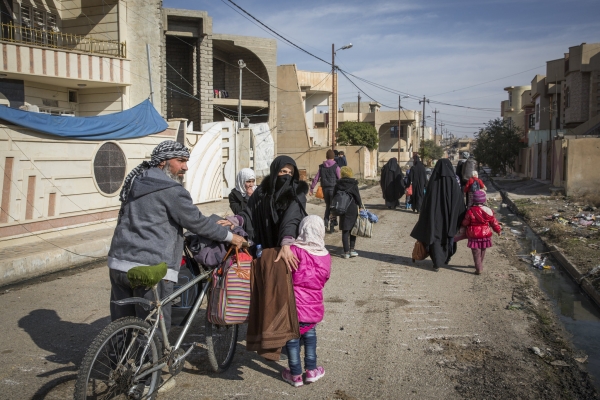As reported by the UN Assistance Mission of Iraq (UNAMI), between October 2016 and January 2017, 2,184 civilians were killed and 3,909 injured in Iraq, even if this date does not include the casualties in the conflict areas. More than 217,000 people have been displaced from Mosul.
Fighting in a city like Mosul requires more effort in order to protect civilians. The eastern part of the city was set free by the Iraqi Security Forces on January, 18th and the western one will be soon involved in this kind of operation to retake control. The main problem concerns the future of the city once it will be retaken. The question is whether the security forces and the still-fractured Iraq will be able to protect the population from ISIS attacks. After the 18th of January, ISIS started taking its revenge by attacking civilians, including NGO workers, through armed drones. On February 15th, the UN decided to temporarily stop humanitarian aid in eastern Mosul as the security conditions are no longer guaranteed.
ISIS fighters use mobile suicide bombs, explosives, unnamed aerial vehicles and snipers to target not only Peshmerga and Iraqi military forces but also civilians.
The conditions of civilians in the city are getting worse as there is not enough food and medicine and the humanitarian aid organization declares that up to 250,000 people will abandon Mosul as a consequence of the increase of military operations, which are expected to last weeks or months. As registered until February 2017, more than 217,000 civilians have been forced to abandon Mosul. Some of them have returned back but their living conditions are not easy as much of the infrastructure, such as bridges, and water and power plants have been destroyed. There is also another risk concerning the re-infiltration of ISIS groups in the city and the increase of violence due to both ISIS combatants and Iraqi soldiers.
"We have to defeat Daesh, but also protect civilians or our mission will fail" , the Chief of Staff of Iraqi Army’s Ninth Armoured Division said.
Currently, because of the lack of a civilian casualty mitigation team, it is not possible to give a precise estimation of the impact of the operations and fighting on civilians. The Iraqi Army has in fact a civil affairs department and a Civilian-Military (CIVMIL) that should deal with civilians after the operations and takes part in the regular UN and government meeting about humanitarian issues, but it is not working properly due to the lack of staff and resources.
As of January, 2017 the organization Airwars reported 2,400 civilian deaths and injuries in Iraq and Syria as a direct consequence of the coalition air operations while the US has acknowledged the unintentional death of 199 people. This information was collected by the Coalition through interviews with pilots and personnel involved, reviews of aircraft video, analysis of government agencies, non-governmental organizations or partner forces of information.
Consequently the US and anti-ISIS coalition should:
Ø Reaffirm the high standard on the use of force and the rules of engagement to protect civilians
Ø Exercise tactical patience to reduce civilian harm
Ø Avoid the use of airstrikes in densely populated areas and use tactical alternatives
Ø Develop guidelines to provide condolence payments to civilians harmed by the operations
As the Islamic State is used to attack the civilian population, the Government of Iraq should introduce a range of measures in order to protect its citizens by establishing patrols, ISF or police near the most vulnerable populations. It should also shift from offensive to stabilization operations in certain areas, such as Western Mosul that could be retaken in the following months, where the defeat of ISIS could mean the increase of bomb and suicide attacks as revenge. This kind of approach would be fundamental not only for the safety of the population but especially for the implementation of trust between the government and its citizens.
Security screenings on civilians raise problems and questions since arbitrary detentions and disappearances have been reported during these years. Civilians described the screening process: men and boys, up to 15 years old, are separated from women and children and taken to different tents. Here the officials check the names of the people through formal and informal lists. It is not clear how these lists are filled and compiled and the UNAMI has sent Iraqi and Kurdish officials guidelines on screenings, but it is not easy to check if there is widespread implementation.
It is going to be hard to reconcile communities and stabilize many territories. Unfortunately a 2009 Iraqi law providing monetary payments for conflict victims has been suspended since the fight against ISIS began, but the Government needs to rebuild infrastructures and industries and should support any effort that is moving toward this direction.
The Government of Iraq should:
Ø Renew the 2009 Iraqi Compensation Law
Ø Rebuild the damaged areas
Ø Identify capable leaders who can lead/rule the multi-ethnic Mosul
Anti-ISIS Coalition should:
Ø Fund the United Nation’s humanitarian appeal for Iraq and support the Government of Iraq’s reconstruction efforts and community-based approaches to governance, economic development, and the rebuilding of courts and schools.
For more information, please read:
http://civiliansinconflict.org/resources/pub/mosul-policy-brief







